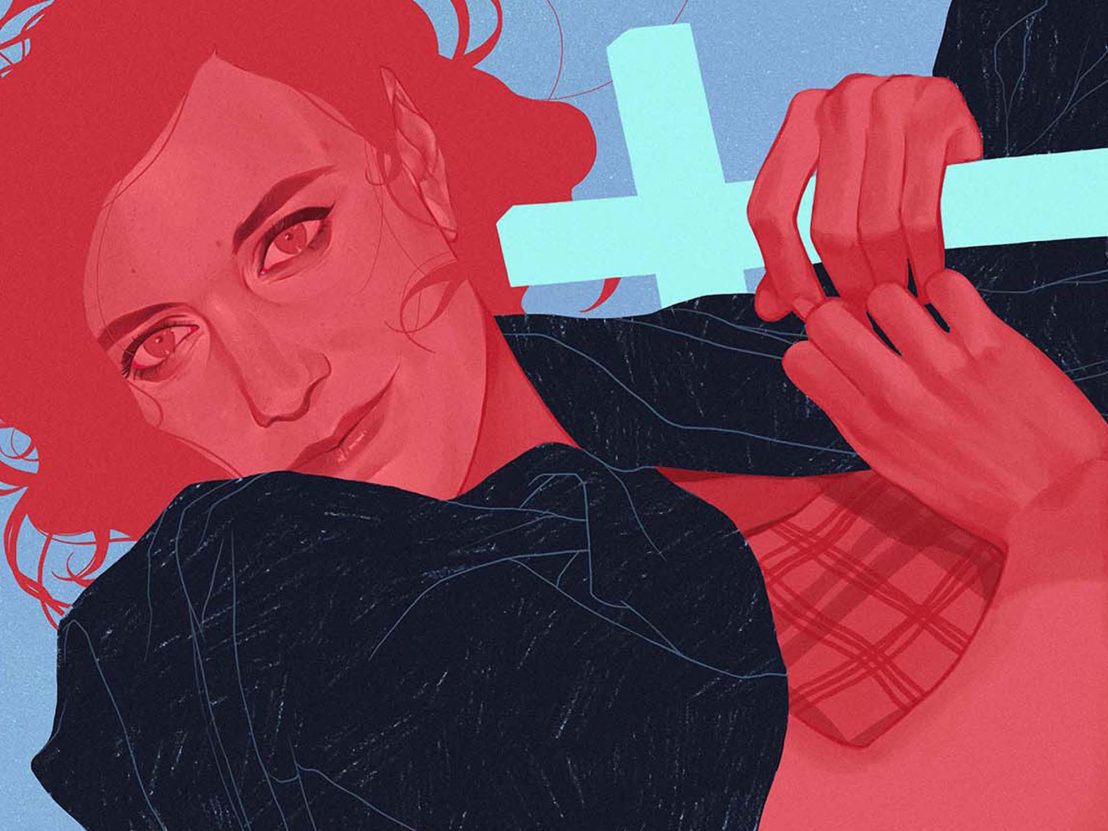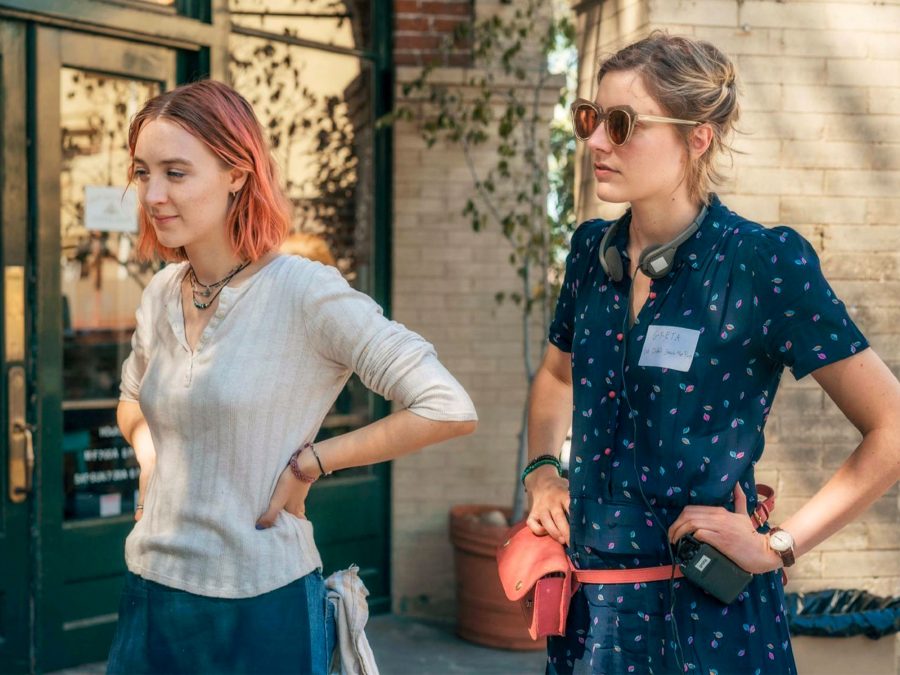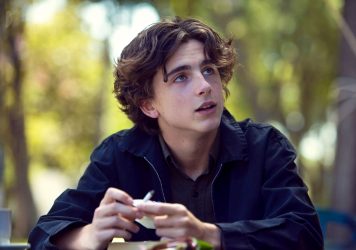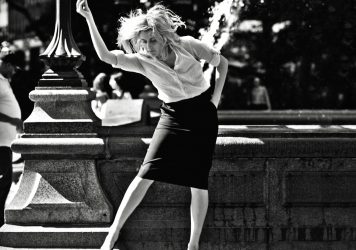
The Lady Bird director espouses filmmaking as a team game and writing scripts inspired by personal memory.
It maybe wasn’t until we saw her as the lead in modern rite-of-passage classic, Frances Ha, that we truly accepted Greta Gerwig as the indomitable screen talent that she is. She rose though the ranks of the ‘mumblecore’ revolution in films such as Hannah Takes the Stairs and Nights and Weekends, has dipped her to into the clammy pools of mainstream Hollywood, and has also fallen in with hyper-literate New York comedy director Noah Baumbach. Now, she’s moved behind the camera for her delicious feature debut, Lady Bird, the story of an outspoken teen (Saoirse Ronan) awkwardly (and often amusingly) transitioning into adulthood.
LWLies: Lady Bird received its world premiere at the Telluride Film Festival. Has it been non-stop for you since then?
Gerwig: It has been non-stop since Telluride. Every time I show it, I have nerves, but it’s been very meaningful to give it to an audience. The film really stops being yours at that point, because they start owning it. Then people start coming up to me and telling me their stories about dropping their son or daughter off at college, or telling me about fights they had with their mother. It feels like it literally starts belonging to other people.
That sounds very bittersweet.
It is, but that’s why you do it. You want to let people own it themselves and you don’t want to keep it as your own secret. I love Emily Dickinson, but I’m not Emily Dickinson. I’m far too social. I can’t imagine making a bunch of art and never really showing it to anyone. I like the process of how a film, at each step, becomes owned by different people. You find a producer, you bring that person on. You find your crew, you bring those people on. You find your cast, your editor, your composer. By the time you give it to the public, you’ve shared your dream world with all these different people.
How do you translate that dream world to other people?
It’s a lot of work. But I was very lucky, my cinematographer Sam Levy is someone I’ve worked with as an actor and he’s photographed things that I’ve co-written with Noah Baumbach. I knew that he had a way of shooting cinema that was driven by words, yet he could make it cinematic. I’m a word-driven writer. I love dialogue and have a very precise script that I don’t change when we’re shooting. He is a person who can collaborate with me to make it something that feels like it exists in the world of film. So we spent a very long time creating shot lists and storyboards, but also just hanging out and talking about movies and photographs and paintings and looking at references. You find these kindred spirits, but then you lay all this groundwork which is both directly talking about the project, but also just spending a lot of time with each other.
Did you reach a point where you thought, ‘Everyone gets it, we can go now?’
Yeah, pretty early on. We did a tonne of tests, with cameras and lenses – because we were using old lenses – and did all this work with the post-production colourist who was messing with the footage in New York and trying to establish what we wanted the film to look like. Sam looked at some of the lenses, and I went through a ton of them too, but then he said, ‘Okay, here are my top five, and I’m not going to say anything. Tell me which one you like’.
Top five lenses?
Yeah. So I looked through the lenses and looked at the sample footage from each and picked number three. And he said that was the exact one he liked. When things like that happen you feel like everyone is on the same page. Then everyone looks at the screen test together to see it, and when every department says, ‘Yes that’s the right kind of lighting,’ or, ‘that’s the right location’, you feel like everyone is together. Also, when my costumer brought me a particular sweater that she used for Lady Bird, the sweater was almost a Proustian memory for me. I said, ‘I’d completely forgotten about this sweater, but it’s completely right’.
How much of Lady Bird is, for you, a Proustian memory?
Well, none of it literally happened. It’s not a documentary, it’s completely fictionalised. But at the same time, there’s a core of emotional truth at the centre which resonates very deeply with what I know to be true. I’m interested in memory. I’m interested in the cinema of memory. I think about Fellini’s Amarcord a lot, and the way you get this sense when you watch it of, ‘No, that’s not what happened, but that is what that moment felt like’. The way he saw everything is heightened, but it also feels somehow correct. I think I’m interested in personal cinema. Not autobiographical cinema but personal cinema.

Is it difficult to build truth into fiction that isn’t autobiographical?
It’s interesting. I’m always interested in the way fiction – and, in a way, lies – can serve a greater truth in art. I guess one way to see it is fiction, and another way to see it is lies. But, to go back to Fellini, he says, “All art is autobiographical. The pearl is the oyster’s autobiography.” I thought that was a great way to explain it. In a way, and maybe it’s because I make films, I don’t have too much of a fascination with whether or not something is quote-unquote true. When I watch movies I don’t think of it that way, I don’t want to go to Wikipedia and see what matches up.
As a fan of the TV sitcom Roseanne, it was lovely to see Laurie Metcalf on screen. And there’s this kind of Roseanne-esque resonance in the film in the way it deals with its central relationship.
That’s interesting. You know, I have never seen Roseanne. I grew up without television so I knew Laurie from stage work in New York. But I also knew about her work with Steppenwolf Theatre Company in Chicago. I guess I saw her in that episode of Horace and Pete where she did that incredible episode on a horse with Pete. She delivers this monologue and it never cuts away from her. It’s great. Do yourself a favour, go watch it online. It’s astounding. I guess I’m aware of Roseanne and the extraordinary talent of all the people involved, because it’s her, John Goodman, all these great people. But I’ve never actually seen it.
I guess it’s this rare dynamic of having the strong matriarch and the passive patriarch. John Goodman is this hulk, but he’s the rational, softly-spoken one, whereas Roseanne is this firebrand. Laurie Metcalf plays her sister.
They’re remaking it I think, or doing more episodes of it.
It ends in this really weird way; it turns out the whole thing was made up.
What?!
It completely flips. It’s crazy.
I did not know that. Maybe one day if I have a broken leg I’ll watch all of Roseanne. I have watched TV now, but I actually avoid longform scripted series. I love them and I think there’s extraordinary things being done in that area, but I think it’s just a different form. The events have different weight because you’re dealing with a much larger canvas. I was writing a lot – writing with Noah, writing alone – and I was working on scripts for hire, and I felt like I was quite inside the form of a movie.
One sitting, 90 minutes to two-and-a-half hours of what the emotional arc of it needs to be and the events that need to happen. I almost didn’t want to break what I felt like I had and intuitively understood and could now do myself. So I’ve been avoiding series, even great ones. I have this kind of superstition around it. Also, the value of images is different because there are so many of them. Shots are different, the music is different because the music is never really supposed to resolve, it’s supposed to keep you going. It doesn’t culminate. I didn’t want to derail what was clicking for me.
Do you have aspirations to adapt a novel?
I do! I have adapted a novel before and I would like to adapt another novel, but it’s tricky. You have to find something that feels cinematic, or that you have a hook into. I think it has to feel like it’s separate from the novel. I think about great adaptations of novels like ‘The Shining’, which I guess Stephen King doesn’t like because he saw something different in it.
You think of all those French New Wave films by Truffaut and Godard, they were all dime-store novel adaptations that felt nothing like the source.
Right, and also interestingly Eric Rohmer wrote all of his movies as short stories or novellas and then he turned those into screenplays, which is a fascinating way to do it. It’s certainly useful to have something to hang your hat on, that inspires you, but is not made whole-cloth by you. I haven’t found quite the thing I want to do, and if I had, I wouldn’t tell you.
Good.
You’d run away with it! But I think it’s an interesting question. It’s something where, if it’s a novel or if it’s a short story, you need to know what it is you’re trying to distill about it. Are you trying to inject someone with the story? That’s not it, there’s got to be something else that’s interesting about it. I think it’s an interesting thing when people come to adaptations, how they choose to work with it, what they’re taking from it. Because I do think that you have to have another idea that’s underneath it.
Paul Thomas Anderson was talking about how he had adapted Inherent Vice. He just went through the book and wrote all the dialogue out, compressed it down and that was it.
The Coens have the best answer to that when they were asked about how they wrote No Country for Old Men. Joel said, ‘I hold the book open and Ethan types’, which is a great Coen response.
Lady Bird is released 16 February.
Published 11 Feb 2018

Greta Gerwig’s non-judgemental approach makes Lady Bird’s relationship with Kyle so relatable.

By Nick Chen
A celebration of the actor’s most memorable moves, from Frances Ha to 20th Century Women.

A hella tight collaboration to celebrate the UK release of Lady Bird.